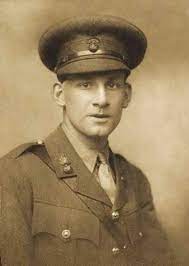
When the war began, Sassoon joined the Royal Welsh Fusiliers. He saw action in France in late 1915 and received a Military Cross for bringing back a wounded soldier during heavy fire.
After Sassoon was wounded in action, he wrote an open letter of protest to the war department in which he refused to fight any more. Sassoon thought his letter would lead to a court-martial, but friend and fellow poet Robert Graves successfully argued that Sassoon was suffering from shell-shock and needed medical treatment. In 1917, Sassoon was hospitalized.
Sassoon's war poems are angry and avoid sentimentality. Many of his detractors argue that his refusal to support the war effort was unpatriotic, but Sassoon's shockingly realistic depictions of war captured the feelings of soldiers and a public grown tired of the carnage.
After the war, Sassoon became involved in Labour Party politics, lectured on pacifism, wrote a trilogy of autobiographical novels, and published a critical biography of Victorian novelist and poet George Meredith. In 1957, Sassoon became a Catholic and began writing religious poems. He died in 1967 from stomach cancer.
Attack
by Siegfried Sassoon
In the wild purple of the glow'ring sun,
Smouldering through spouts of drifting smoke that shroud
The menacing scarred slope; and, one by one,
Tanks creep and topple forward to the wire.
The barrage roars and lifts. Then, clumsily bowed
With bombs and guns and shovels and battle-gear,
Men jostle and climb to, meet the bristling fire.
Lines of grey, muttering faces, masked with fear,
They leave their trenches, going over the top,
While time ticks blank and busy on their wrists,
And hope, with furtive eyes and grappling fists,
Flounders in mud. O Jesus, make it stop!


